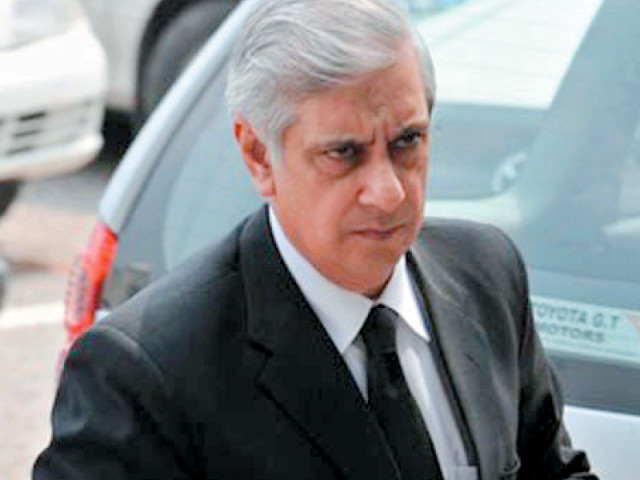Avoiding controversy: Caretakers won’t try Musharraf for treason
Such matters should be left to an elected government, says attorney general.

"It will not be appropriate for the caretaker government to take a position in respect of Article 6 of the Constitution," says Attorney General Irfan Qadir.
Those who thought the caretaker government would take it upon itself to initiate treason proceedings against former military ruler General (retd) Pervez Musharraf are in for a disappointment.
On Monday, a three-member bench of the Supreme Court was informed by Attorney General Irfan Qadir that the caretakers are in no mood to court controversy by initiating proceedings under Article 6 of the Constitution against Musharraf.
He told the court that the interim government did not want to hand over any unwanted excess baggage to the next government, saying “It will not be appropriate for the caretaker government to deliberate or take a position in respect of Article 6, which is likely to become a controversial exercise in the long term for both the political parties and institutions of the state.”
He added that it should be left to the elected government to take an appropriate position on Article 6 and its legal processes, along with the manner and scope of its implementation. It is the next government, said Qadir, which must decide who should be proceeded against. The government’s written response also stated that, with less than three weeks left for the elections, there was no real urgency in the matter.
The statement added that, in a recently held meeting, the caretaker government also deferred some items of the Council of Common Interests (CCI) for the next government to handle. The reason for this deferment is that the interim government does not want to enter into any agreements or treaties that will be binding on whoever forms the government after the elections.
In his statement, Qadir pointed out that the caretakers turned down a request for intercession in the Reko Diq affair as this was best left to an elected government to decide on. Meanwhile, the federal joint secretary of the ministry of interior, Khushdil Khan, informed the bench that there was nothing on record about any proceedings regarding Musharraf’s trial under Article 6.
He said the interior ministry never received a copy of the unanimous resolution passed by the Senate on January 23, 2012, or that of another resolution passed a few days ago which called for Musharraf to be tried for treason. Khan also said that no action had been initiated even after Musharraf’s return on March 24, 2013.
The bench, headed by Justice Jawad S Khawaja and also comprising of Justices Khilji Arif Hussain and Ejaz Afzal Khan deferred the hearing till Tuesday and asked the lawyers representing Musharraf to get fresh instructions from their client and respond to the petitions asking for initiation of a treason trial against him.
Earlier in the hearing the bench directed Musharraf’s counsels, Ahmed Raza Kasuri, Malik Qamar Afzal and Ibrahim Satti to go and meet their client, who is currently detained at his residence in Chak Shahzad. The lawyers returned saying the jail authorities did not allow them to see Musharraf despite the court’s orders.
The court then issued an order directing the Adiala Jail superintendent to allow the lawyers to meet their client.
While speaking to the court, Kasuri said he and his fellow advocates had already raised objections over the composition of the bench as the judges on it had taken oaths under the Provisional Constitution Order (PCO). Repeating his stance, he said a full court bench should be constituted as further disparaging arguments and remarks could be made against the judges, necessitating the need for a full bench.
Justice Khawaja replied that the judges were used to hearing such remarks and would listen patiently. Kasuri, he said, should not shy away from making such comments.
Meanwhile, Advocate Abdul Hakeem Khan, one of the petitioners against Musharraf, put a new application before the bench, asking for the federal government to be directed to transfer Musharraf from his farm house to Adiala Jail. He argues that the former dictator should be treated like a common criminal and that ‘VIP treatment’ should not be extended to him.
Published in The Express Tribune, April 23rd, 2013.



1724319076-0/Untitled-design-(5)1724319076-0-208x130.webp)















COMMENTS
Comments are moderated and generally will be posted if they are on-topic and not abusive.
For more information, please see our Comments FAQ